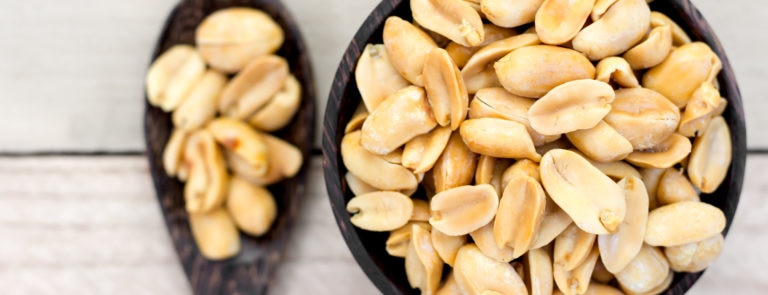15% off €30 or 20% off €40
Code:CHOOSE
What is powdered peanut butter?

Been seeing peanut butter powder around but not quite sure what it is? Find out how it's made, it’s benefits, and what makes it different to peanut butter.
Don’t like the ‘claggy’ texture of regular peanut butter but love that peanut-y taste? Perhaps you’re trying to avoid the calorie-count of your normal peanut butter? Powdered peanut butter could be the way forward. All the goodness of the world’s favourite nut butter ground into a fine powder, powdered peanut butter is a new way to include some nutty nutrients into your diet.
How is powdered peanut butter made?
Roasted peanuts get most of their oil pressed out of them before getting finely ground, resulting in a rich-flavoured peanut butter powder. Some brands then add a little sugar, salt or sweetener to make up for the some of the other flavour components lost from the fats.
How does powdered peanut butter work?
Water needs to be added to powdered peanut butter to give it a smooth consistency if you want to add it to foods like toast or bagels. If you want to add it to smoothies, yoghurt or other recipes with enough liquid, you can simply sprinkle in the powder – easy!
Health benefits of peanut butter powder
Here’s a few reasons why you may want to give peanut butter powder a go.
A different texture
Some people just don’t like the smooth, creamy and ‘stick-to-the-top-of-your-mouth’ texture of regular peanut butter, and that’s ok. Peanut butter powder creates a slightly less ‘claggy’ paste – which allows you to enjoy the taste and benefits of regular peanut butter without grossing your mouth out!
Lower in calories
Peanut butter has fewer calories than normal peanut butter. This is because the majority of the fats have been removed in the powdering process.
Take these brands for example:
- A 12g serving (2 tbsp of powder with 1tbsp of water) of PPB Powdered Peanut Butter Original contains 48 calories.
- A 12g serving of Pip & Nut Peanut Butter contains 73 calories.
The peanut butter powder mixed with water will create a larger serving size of peanut butter (less dense) with 25 fewer calories per serving – which can easily add up!
Swapping regular peanut butter for powdered means you get to enjoy the natural peanut taste with less calories – this can be helpful if you are on a calorie-controlled diet or are tracking your macros.
P.S. Eating regular peanut butter or just peanuts will not necessarily make you gain weight. Research shows that despite them being a rich source of fat and calories, it doesn’t mean they will contribute to weight gain.1 This may be because they make you feel satisfied and less likely to overeat throughout the day.2
Lower in fat
One of the major selling points of powdered peanut butter is that it has a significantly lower fat content when compared to regular peanut butter. For example, PPB Powdered Peanut Butter has 70% less fat than traditional peanut butter, compared to leading supermarket brands.
Now, the fats found in peanut butter are largely unsaturated and considered healthy but eating too much of them can still cause weight gain as they usually come with a significant amount of calories.
So, if you already eat a lot of healthy fats from foods like olive oil, avocados and other nuts, peanut butter powder could help you balance your intake. It could also be useful if you need to reduce your overall fat intake for some reason, but still want to enjoy a natural peanut butter taste.
Easy to cook with
One of the real perks of peanut butter powder is how versatile and easy it is to cook with it is. Powdered peanut butter contains very little fat, so it is easier to mix with liquids and sauces than regular nut butters.
Simply mix it with water to make a peanut-butter-like paste to spread onto bread, use in bakes, and dip batons of apple and cucumber into. You can also use peanut butter powder as a dry seasoning for meats, tofu, vegetables, etc.
Try using it in the following dishes:
- Banana and peanut butter porridge (just use powdered peanut butter)
- Fruit smoothies
- Protein shakes
- Pancake batter
- On top of popcorn
- Mixed into flour to coat meat, tofu, veg, etc.
- Satay sauce
- Curries, like this Thai Tofu Laksa
Less likely to cause choking
Elderly people and very young children are often advised to avoid traditional peanut butter as they have a high risk of choking. This is mainly due to its ‘stick-to-the-top-of-your-mouth’ texture, which can sometimes temporarily block windpipes.
Peanut butter powder provides an alternative way to get a rich peanut butter flavour without having to use a thick paste.
Simply sprinkle it onto foods or stir a little into yoghurts or other creamy foods. P.S. Using it as a rehydrated peanut-like paste may still cause an increased choking risk as it will feel similar to regular peanut butter, so treat it as the same.
Packed with protein
Peanut butter powder is full of healthy plant protein. Each serving contains around 6g of complete protein, largely due to peanuts having more protein than any other nut.3 And as it’s lower in calories than peanuts or normal peanut butter, you can add it into protein shakes without adding as much fat and calories.
In fact, if you look at peanut’s Protein Digestibility Corrected Amino Acid Score (PDCAAS), it shows that peanut proteins are nutritionally equivalent to eggs and meat for human growth.4 Protein is needed to help your muscles grow and repair, and it can also help you feel satisfied for longer.
Is powdered peanut butter better than normal peanut butter?
It depends on what you’re looking for from your peanuts!
Peanut butter powdered products are a less calorie- and fat-laden way to flavour food and enjoy plant-based protein.
Traditional peanut butter is a complete food full of fats that will help keep you feeling satisfied with a thick and creamy texture.
One is not healthier than the other, it totally depends on what you want. However, it is worth noting the following potential downfalls of peanut butter powder:
It may contain fewer fat-soluble vitamins
One of the potential drawbacks of peanut butter powder is a concern some have about its fat-soluble vitamins. As most of the fat has been removed to make powdered peanut butter, there is a concern that the fat-soluble vitamins usually found in peanuts are lost too.
Vitamin E is quite abundant naturally in peanuts, with 100g of them providing 55.5% of your RDA.5 This antioxidant can help to fight against the damage caused by free radicals.
However, most of this vitamin E would be found in the fat of peanuts and peanut butter, and so peanut butter powder is unlikely to be a good source of vitamin E.
Contains added salt and sugar
Some brands of peanut butter powder add in extra salt and sugar to replace the flavour lost from taking most of the fat out. If this bothers you, just have a look at product labels and remember: the fewer the ingredients, the better!
What powdered peanut butters are available?
Like with normal peanut butter, the healthiest peanut powder is the one with the least extra ingredients, like salt and sugar.
Peanut butter powders are slightly more prone to these sneaky additives as manufacturers endeavour to replace the tastes lost from eliminating the fat in production. Don’t worry, there are more naturally tasty peanut butter powders out there without all of those additives, like:
- PPB Powdered Peanut Butter Original This popular peanut butter powder is made of peanut flour (powdered peanut), palmyra jaggery nectar powder (a natural sweetener) and mineral sea salt
- PPB Powdered Peanut Butter Chocolate Made of the same stuff as the original one above + some cocoa powder
- PPB Powdered Peanut Butter Cinnamon Same again, but with – you guessed it – cinnamon!
Can you make powdered peanut butter?
Without industrial equipment, it would be quite hard to remove all of the oil from peanuts to make your own powdered peanut butter completely from scratch. However, you could see if you could purchase peanut butter flour online and try to make your own – simply skipping that first step.
Who sells powdered peanut butter?
We do! As mentioned above, we stock PPB here at Holland & Barrett and you won't find any added salt or sugar.



